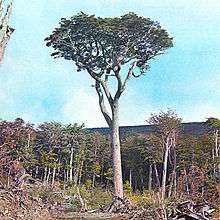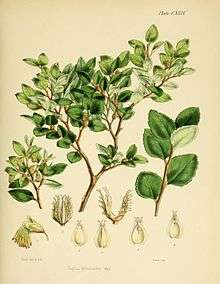Nothofagus betuloides
Nothofagus betuloides, Magellan's beech[1] or guindo, is a tree native to southern Patagonia.
| Nothofagus betuloides | |
|---|---|
 | |
| Scientific classification | |
| Kingdom: | Plantae |
| Clade: | Tracheophytes |
| Clade: | Angiosperms |
| Clade: | Eudicots |
| Clade: | Rosids |
| Order: | Fagales |
| Family: | Nothofagaceae |
| Genus: | Nothofagus |
| Species: | N. betuloides |
| Binomial name | |
| Nothofagus betuloides | |
| Synonyms[2] | |
| |
In 1769, Sir Joseph Banks collected a specimen of the tree in Tierra del Fuego during Captain Cook's first voyage.[3]
Its occurrence on Hornos Island earns it the distinction of being the southernmost tree on Earth.[4]
Distribution
Nothofagus betuloides grows from southern Chile and southern Argentina (40°S) to Tierra del Fuego (56°S). It is found from sea level to 500 m (1,600 ft) above mean sea level. One specimen growing near the southeastern corner of Hornos Island (Cape Horn) was identified in 2019 as the southernmost tree in the world.[4]
Description
It is an evergreen tree up to 25 m (82 ft) tall, with a columnar appearance. In its natural environment, it tolerates cold winters and absence of heat in summer. Specimens from the southern forests resist temperatures down to −20 °C (−4 °F).
Cultivation
It succeeds in Scotland. Trees planted in the Faroe Islands, which were imported directly from its southernmost distribution in Tierra del Fuego, have turned out to be very hardy.[5]
The wood has beautiful marks, and is pinkish, hard, and semiheavy; it is used in furniture and construction.
 Illustration from specimens collected by the Endeavour, Tierra del Fuego, 1769
Illustration from specimens collected by the Endeavour, Tierra del Fuego, 1769 Fagus betuloides in Joseph Dalton Hooker's Flora Antarctica 1844–1846, from the Ross expedition of 1839–1843
Fagus betuloides in Joseph Dalton Hooker's Flora Antarctica 1844–1846, from the Ross expedition of 1839–1843
References
- Baldwin, H. (2018). "Nothofagus betuloides". IUCN Red List of Threatened Species. 2018: e.T96477315A96479945. Retrieved 24 April 2020.
- "The Plant List: A Working List of All Plant Species".
- Kew gardens, or A popular guide to the Royal Botanic Gardens of Kew by Sir W.J. Hooker
- Welch, Craig (July 2020). "The tree at the bottom of the world—and the wind-blasted trek to find it". National Geographic. Retrieved July 13, 2020.
- Højgaard, A., J. Jóhansen, and S. Ødum (eds) 1989. A century of tree planting in the Faroe Islands. Føroya Frodskaparfelag, Torshavn.
- Donoso, C. 2005. Árboles nativos de Chile. Guía de reconocimiento. Edición 4. Marisa Cuneo Ediciones, Valdivia, Chile. 136p.
- Hoffmann, Adriana. 1998. Flora Silvestre de Chile, Zona Central. Edición 4. Fundación Claudio Gay, Santiago. 254p.
- Rodríguez, R. & Quezada, M. 2003. Fagaceae. En C. Marticorena y R. Rodríguez [eds.], Flora de Chile Vol. 2(2), pp 64–76. Universidad de Concepción, Concepción.
- "Nothofagus betuloides". Encyclopedia of Chilean Flora. Retrieved 2009-06-27.
- "Magellan's beech". Chilebosque. Retrieved 2009-06-27.
- "Nothofagus betuloides in the Netherlands". PlantenTuin Esveld. Retrieved 2009-06-27.
